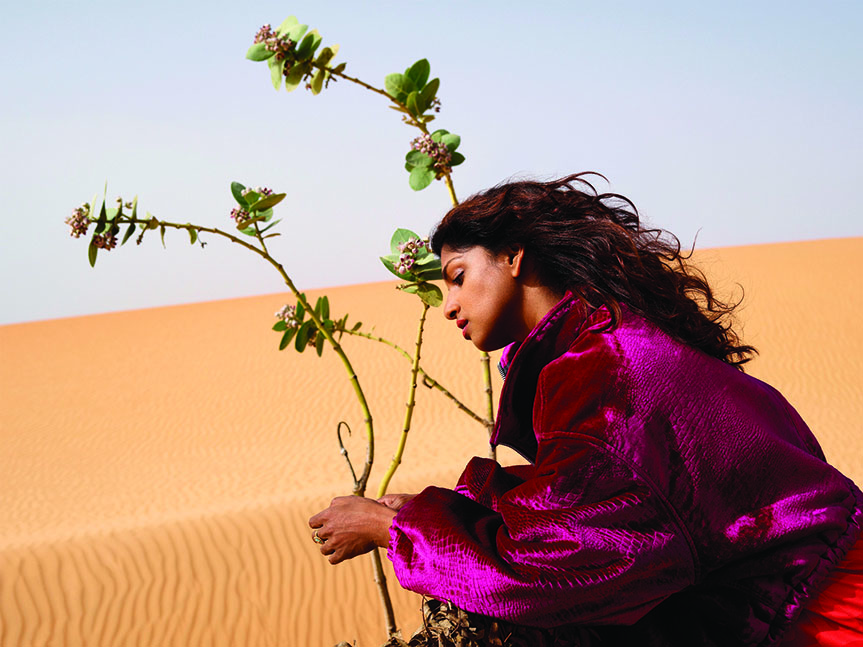M.I.A.: On Her Own Terms
The English rapper continues taking up causes that no one will care about on her most personal record to date

M.I.A.: “I didn’t want people to say she’s a ‘South Asian musician,’ I wanted them to say, ‘She’s a musician’.” Photo: Viviane Sassen/Courtesy of the artist
Maya Arulpragasam aka M.I.A. is on a mission towards world peace with her fifth, and possibly final, studio album AIM. “I think my work is often about building bridges between the East and the West,” says the English rapper and producer over the phone while on a (not-so) secret visit to India last month to shoot a music video. M.I.A’s outspokenness has burnt as many bridges as it has tried to build–she’s been denied the US visa for her perceived support for a ‘terrorist’ organization in Sri Lanka, her comments on Black Lives Matter, saying that Muslim and Syrian lives matter too, cost her a headlining slot at the Afropunk festival in London and there seems to be a general air of controversy around her.
The backlash she spawns every now and then has everything to do with the formidable lyrical force she is: the themes in her spitfire debut album Arular in 2004 covered everything from the Tamil independence movement, the Iraq war to her own day-to-day life and the cultural struggles of growing up as a Sri Lankan in London even as she traversed a curious sonic scape of hip-hop, electro-funk and punk.

M.I.A’s outspokenness has burnt as many bridges as it has tried to build. Photo: Daniel Sannwald/Courtesy of the artist
On her latest record AIM, she’s tried to mellow things down a bit. “It’s definitely more reflective and personal,” she says. “It’s just where I am in my life right now. Like even if you take the Sri Lankan situation, it’s not a political thing; it’s introspective.” M.I.A says there are points in AIM where she discusses the injustice with which the Tamil struggle was treated, but this time, she’s talking more about its current effects on ordinary people in modern times. Highlighting its ugly political side is pointless now, she says. “Nobody has any integrity and value in politics. Things have changed so much now and people do what they want.”
When it came to the production of the album, M.I.A. wanted to keep it eclectic and representative of all kinds of people. “I got some brown producers, white producers and black producers–And there’s Indian samples, Middle-Eastern samples and American ones–It’s quite global. It’s the United Colors of Benetton of albums,” she says with a laugh, adding, “When I first started writing music, I wanted to be relatable to everybody, not just in my community. I did my own music, my own art, my own clothes and I over-worked. I didn’t want people to say she’s a ‘South Asian musician,’ I wanted them to say, ‘She’s a musician’.”
M.I.A’s rough ride to success as a female artist of Asian origin ideally should have opened doors for more Asian artists in mainstream music. But the industry is a tough nut to crack. “I thought right now we’d have fifteen girls or guys doing this,” she says, adding the only other artist of South East Asian origin with a massive mainstream following is English singer Zayn Malik (who is also her collaborator on her latest single “Freedun”). She says, “We can make music and still include all kinds of people, be accessible to people and make music accessible.” For instance, when she decides to come on an India tour, she doesn’t want to do a run-of-the-mill show in a stadium; she wants people from all walks of life in India to be able to attend her shows and be a part of something global.
One of the reasons M.I.A. has always incorporated India into her music and videos is to bring hip-hop culture to India and in turn bring Indian culture to hip-hop. “My first-ever video [2004’s “Sunshowers”] was shot in Kerala in the jungle,” she recalls. “That was me trying to connect with the avant-garde filmmakers in India. Then I came back to do “Bird Flu” [from 2007’s Kala.]” Her return to India in 2015 was to film the video for her hit single “Borders,” which dealt with the current global refugee crisis.
Her more recent and yet-to-be revealed project will be her fourth music video filmed here, involving actors and producers from the Tamil film industry. The idea is to showcase the actual goodwill between Indian Tamils and Sri Lankan Tamils. The video will convey the kinship she personally feels with India as a Tamil with Sri Lankan roots. “I think that’s the bit I’m going to explore in this video,” she says after a contemplative pause. “How as a person you can find strength to carry on and get through all the adversity, and draw from ancient history and culture to [do so.]” The one thing that she finds most problematic about India right now is its “quest to become like America or China”. She says, “We’re only paying attention to capitalism and wanting to get richer and richer and richer.”
Watch M.I.A.’s video for “Borders” below:



